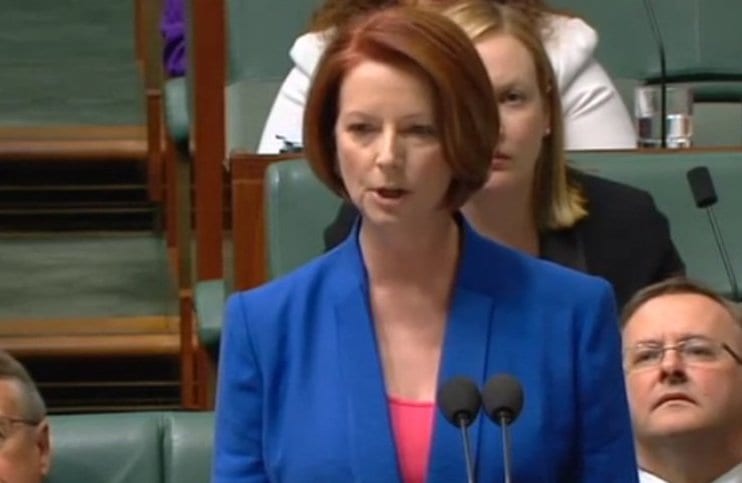I, like many women around Australia this week, watched the documentary Strong Female Lead detailing Julia Gillard’s term as Australia’s first female Prime Minister and the abhorrent sexism she endured at the hands of fellow politicians, the media and the broader Australian public. And I, like many Australian women, found myself yelling at the television, and at times shedding a tear for Julia’s experience.
I, as I’m sure many others have also found themselves in the days since, have reflected on where I was when this all happened.
I am now 23, meaning I was twelve when Gillard became Australia’s first female Prime Minister, and although I was young, I remember it clearly because my memories are steeped in shame.
I remember my mother asking me, upon Gillard’s election, how I felt seeing a woman lead our country for the first time. My response at the time rings in my ears: “I’m glad it’s a woman, but why did it have to be this woman?”
I was twelve. I was not particularly politically engaged outside of the 7.30 news being the uniform background to family dinners, but this rhetoric had seeped through to my young mind– the same rhetoric which permeated Strong Female Lead.
I thought what Gillard had done to Rudd had been unfair, I thought she was annoying, I thought she didn’t represent the best side of women, and, if anything, she was setting us back.
I thought this because of the portrayal of Gillard, not Gillard herself.
Whilst I had never thought about what Kevin Rudd wore, nightly reporting of Gillard’s outfits made me think it was fair game and in fact a worthy conversation to have. It was a topic I could carry to the school yard the next day to demean our historic leader.
My statement, “I’m glad it’s a woman, but why did it have to be this woman?” on reflection would not have seemed out of place if I saw it on Strong Female Lead said by the likes of Tony Abbot or Alan Jones. It was a gutless way to hide from the sexism of my own comments.
I see now, that regardless of which woman had stepped up to the plate at that time, their treatment would have been the same as Gillard’s. Conservative media would still have analysed her body language with foreign leaders, her political peers would have shown her far less respect than her male counterparts and purported feminists still would have found it amusing to comment on her body.
And I, as a young woman, still would have supported the notion of a female leader in theory, but not in reality.
The fact I held this sexist view as a child is not something that should be dismissed or deemed irrelevant, because it shows the insidious nature of the impact the roaring sexism in our parliamentary system has on young women.
I have been raised by two progressive parents. My parents serve in roles which defy stereotypical gender norms. I have, on many occasions since my childhood, been asked how my father feels that my mother gets to ‘crack the whip at home and at work’, or that my mother ‘has him by the balls’. I always knew this question would not have been asked of me if my parent’s roles had been reversed.
So if I knew that was wrong, why did I not understand, when this circumstance played out on a national stage that it was equally grotesque?
The answer is because that is not what I was socialised to believe. Undoubtedly, our families are our biggest influencers, which is why in my home life I knew that sexism was wrong. But despite the influence of our micro circle there is no escaping the fact the macro impacts us too and that is what happened with our first female Prime Minister. To myself, and countless other young Australian women.
The role of the media and her political rivals cannot be under scrutinised for their impact in diminishing the accomplishments of an incredible woman, and robbing a generation of young women in basking in a truly exciting historical moment.
Today, I work as a staffer for the Labor Party with Gillard’s impact echoing resoundingly through the party, and Australia as a whole. As Julia said in her Vale speech, she had made it easier for the next woman and the woman after that.
In the meantime, as we wait for the next worthy woman to hold this role, all it seems appropriate to say to our first PM is thank you, and we are sorry.


